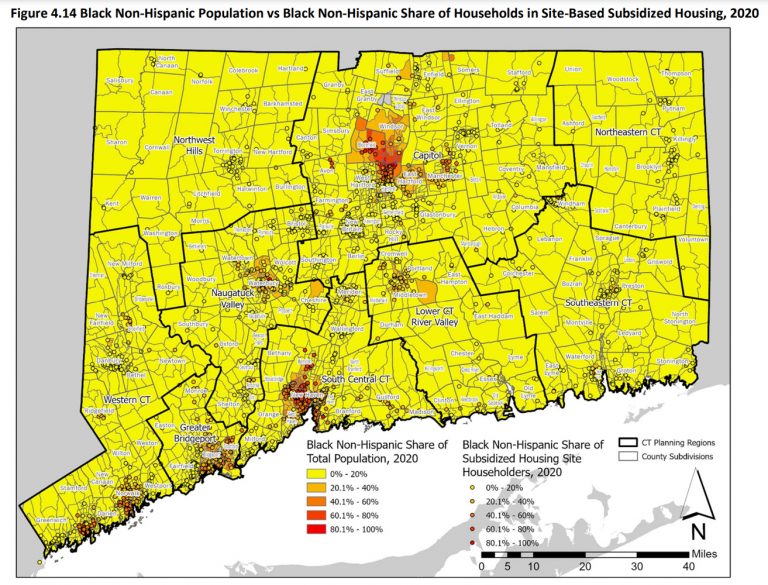A recent study funded by the state reveals that Connecticut is experiencing rising racial and economic segregation, marking it one of the most segregated regions in the nation. This trend is particularly evident in certain areas across the state.
The Fairfield County Center for Housing Opportunity (FCCHO) conducted a virtual forum on the report Wednesday.
“There are few, if any, surprises in this study,” said former Housing Commissioner Evonne Klein, as she began the event. “Still, we need to discuss the findings, and most importantly, the possible solutions and actions that should be taken not only in the legislative session, but also in other arenas.”
“Leaving this study to collect dust would not only be a missed opportunity, but an injustice,” she said.
The Connecticut Housing and Segregation study found that Connecticut remains one of the most racially and economically segregated states in the nation, although some progress has been made in the last 30 years. The report made several recommendations to address these issues, including increasing access to subsidized housing and housing vouchers, changing laws to encourage more housing development, and promoting economic mobility.
Deputy Housing Commissioner Brandon McGee spoke about the efforts the Department of Housing is currently undertaking.
“We know that segregation is very old, but still in front of us and very complex,” McGee said. “The report does recognize that progress has been made, particularly in our urban centers. But we at the department recognize that we must do more.”
According to McGee, the department has provided support for nearly 5,000 housing units currently under construction, aiming to address both the state’s affordable housing crisis more broadly and segregation specifically by decentralizing the locations of affordable housing.
Tanya Hills, director of learning and evaluation at Fairfield County’s Community Foundation described some of the programs her organization has helped to implement in Fairfield, which is one of the most segregated counties in the state.
“We’ve started a community incubator program, where we invest in promising ideas for equity and social change by awarding diverse community residents and leaders of grassroots organizations with financial support and coaching to accelerate innovation and community based solutions,” she said.
One of the problems that prevents forward progress on these issues is the way that harmful narratives influence thinking about what people deserve, Vanessa Liles, co-project director of PT Partners, said.
“What ties us all together is the dignity and freedom that we all want to have. The way in which we approach our work is building a counternarrative,” she said. “The tropes that have been used against women [in subsidized housing] have been used to continue oppression.”
Liles reiterated that safe housing is a right, and that everyone should have access regardless of their circumstances.
“We don’t need to say to a person that they need to have a full-time job, and have the father of their children in their life or be married to that person in order to say, ‘You deserve dignified housing.’ We want to create a counter narrative to help people understand that their humanity is ever present and doesn’t have to come in a package that feels good to other people,” she said.
The Harmony Project at the Greenwich YWCA provides critical domestic violence services for the town and surrounding area. As the housing coordinator of the program, D’Andra Lewin spoke about what she’s seen survivors encounter first hand when looking for safe housing.
“I’ve encountered a number of barriers when it comes to housing in Fairfield county, especially for such a high need and vulnerable population,” she said. “The greatest difficulty I see is locating affordable housing in Fairfield county. Right now, we have some of the highest fair market rents in the nation, and they’re outpacing current wages and inflation.
“As noted earlier, the wait time for public housing is over a year,” Lewin said. “For a family in an immediate crisis, that’s really a setback.”
Kirk Wesley, senior community organizer and outreach coordinator at Open Communities Alliance and a Bridgeport resident for 24 years, sees an opportunity for grassroots organizing to make a difference in the housing and segregation crises facing the state.
“When I think about political will, it comes back to the will of the people, because it’s the people who allow politicians to be who they are. Organized people and organized money equals power, and we need to have those things to challenge the systems and structures that create these barriers. In order to move the needle on these issues, we have to understand that there’s strength in numbers,” Wesley said.
FCCHO is a partnership between The Housing Collective, Partnerships for Strong Communities, and Fairfield County’s Community Foundation designed to work collaboratively across the region to deliver safe, equitable, and affordable housing solutions for families and individuals.






